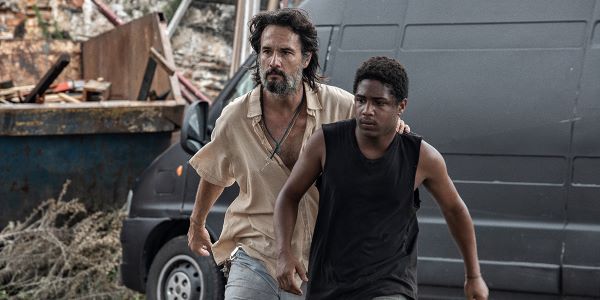
This year’s screenings at the Toronto International Film Festival were held in person throughout the city, though smaller in number from the last in-person event in 2019. However, most movies in the programming were available to Canadians (and press from around the world) online.
Nevertheless, the festival had a Before Times feel to it, even while viewing the movies hundreds of miles away from the Canadian border. Though the number of titles had been scaled back from roughly 300 to 100, there were more than enough to choose from. Instead of feeling overwhelmed by the number, the reduced lineup helped to narrow the options, though it wasn’t easy. One could overdo it, bingeing to one’s heart’s content. In that way, the festival almost felt like an all in-person event, though with the advantage of not having to race across town for a screening and the ability to watch a movie based on one’s schedule.
As is the norm, the programmers chose from the usual (festival) suspects: Berlin, Cannes, Venice, and a few from Sundance. One movie that will be accessible soon to millions internationally—the opposite fate of so many TIFF films in any given year—is Brazilian-American director Alexandre Moratto’s taut, terse, gritty drama 7 Prisoners, which came straight to Toronto from its world premiere in Venice. Dealing with “modern-day enslavement and human trafficking,” in the words of Moratto in his online introduction, the Portuguese-language film will launch on Netflix this fall.
In his late teens, Mateus (Christian Malheiros) leaves the family farm to take on São Paulo, where he has been promised a lucrative job at a scrapyard through a family friend. The contrast between the countryside where he grew up and the favelas and the towering high-rises in the metropolis of more than 22 million are succinctly captured in a simple montage. The overall editing is nothing if not to the point.
All of Mateus’s expectations of big city life hit a wall immediately. He finds in short order that transportation and room and board costs will be taken out of his pay. In another departure from what he has been promised, he and the other young men from the countryside must work dusk to dawn, stripping auto parts for copper while a beefy thug with a gun stands guard; the workers are not allowed to ever step outside of the junk yard. If anyone breaks the rigid rules, all are punished with overtime and no more showering privileges, to name two punishments. Most crucially, the hirsute boss, Luca (Rodrigo Santoro, in a stark change of pace from his leading man roles), confiscates all phones and IDs. The scrapyard’s output, copper wires, will be repurposed, and in another telling montage, Luca points to the scrapyard’s handiwork: miles and miles of electrical, telephone, and train lines—one of the film’s strongest indictments of a pervasive and endemic system of exploitation.
The script doles out the tension throughout its fleet 93-minute running time. The economical screenplay gives you enough information about the guys from the sticks without laying it on thick, though among the workers, only Mateus fully breaks out of the country bumpkin type. Because he knows how to read—he left school at the eighth grade—he becomes the natural leader among the four. However, given his constricted options, Mateus backs down from Luca’s threats, later defies them, and then bargains with the boss, becoming complicit in multiple crimes.
As Luca, Santoro makes for a great antagonist: he knows he holds all the power over the young men, but the actor reveals vulnerability and fear. If the overseer overlooks one detail or lets down his guard, the lucrative enterprise goes up in smoke.
The most nuanced portrayal here is the knotty relationship between him and his star worker, Mateus, which is based on manipulation. By rewarding Mateus with a night on the town and a meeting with the big boss—not coincidentally a politico—Luca becomes a credible father-like figure in the eyes of his underling. In many ways, what Mateus undergoes could be considered a textbook case of the Stockholm syndrome. By bonding with his captor, he realizes his fate is linked with Luca’s, and chooses what he hopes will be the lesser of two evils.
You may not be too surprised at how the film develops—to a point. Part of the suspense derives from the hope that the plot will turn into a breakout film. Someone is always hatching a new scheme, either to escape or, in Mateus’s case, to negotiate. Though the pattern of Luca’s exploitation of the young men becomes apparent early on, there is a twist, where the director leads viewers to a doozy of an ending.
7 Prisoners will launch on Netflix in November.






Leave A Comment